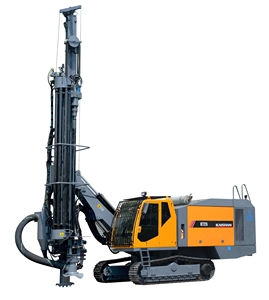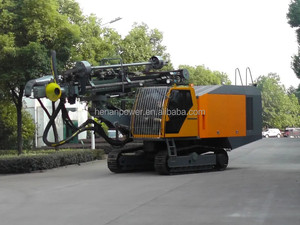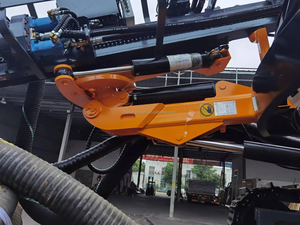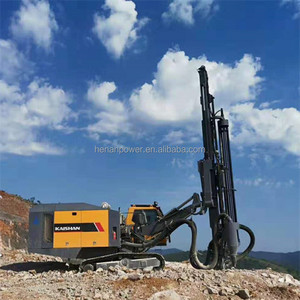
All categories
Featured selections
Trade Assurance
Buyer Central
Help Center
Get the app
Become a supplier

(462 products available)








































Core drilling machines are used to make precise holes in concrete and other materials. Hilti core drilling machines come in different types, which include:
Hand-held core drills are smaller and portable, allowing for operation with one hand. It is suitable for making holes in walls, ceilings, and columns. Many are lightweight for easy handling without sacrificing power. Such models often come with variable speed control to adjust the drilling speed depending on the material.
Core drill rigs are heavy-duty machines designed for large-scale projects. They offer high torque for deep and wide holes. It is usually mounted to a base for stability during drilling. They are also used for producing numerous precise holes in concrete. Most models have adjustable speeds to enable better control when drilling different materials.
Hilti diamond wire saws are specialists used to cut large openings in thick concrete structures. It is flexible and can cut curved openings. The saw uses a diamond-coated wire, which provides smooth and precise cuts. It is mainly useful for oversized cores, unlike traditional drills.
Wall saws are used to create rectangular openings in walls. Just like diamond wire saws, it also uses diamond blades to cut through reinforced concrete.
For the devices to work well and last long, they need regular service, especially with drills for tough materials like concrete that produce lots of dust. Here are tips on how to maintain and repair drills:
Regular maintenance: Regular maintenance involves cleaning dust filters before and after use and checking coolant levels on wet drills. Users should inspect hoses, brushes, and cables for damage on dry models. Lubricate moving parts as instructed in the manual. Replace worn parts like clutches, belts, and bearings with original spares.
Storing the equipment: Equipment should be stored in dry places protected from moisture and extreme temperatures. A hard case for a handheld drill or transport boxes for a rig are ideal.
Repairs:Complex repairs, like internal motor work, should be done by certified technicians. Drills that have been in use for many years have internal components that wear. Consider reconditioning them with original manufacturer parts.
Ordering parts:Distributors should order repair kits and spare parts directly from the manufacturer to ensure quality.
Hilti core drilling machines are widely used in the construction and renovation of buildings. They create openings for plumbing, electrical wiring, and HVAC systems. They also install vertical columns and beams during building structural work. Core drills make precise holes in walls, floors, and ceilings for the installation of new windows.
Core drills are used by energy sector workers to make holes in concrete foundations for wind turbine installation. They also create access points for cable-laying in drilling operations. Drills can also be used to create core samples for geological analysis.
In manufacturing, drilled holes in industrial machinery and equipment are frequently required. They are used in the production of concrete pipes and blocks in precast factories. Core drills are also used by metal workers to install anchors and hardware in metal carbide machinery.
Core drills are widely used in infrastructure projects to create roadbed core samples for analyzing soil composition. They make concrete core test specimens used for evaluating the compressive strength of concrete used in bridges and public works. Core drills make large core samples used for pavement analysis.
Core drills are necessary for utility workers to make access holes for the installation of water and sewer lines. They create pathways for underground electric and cable TV lines. Concrete core drills are used for cutting through pavement to access buried utilities. They also make precise holes for providing fiber-optic cable installations.
Investigate the drill's bit compatibility, power sources, and mounting methods to ensure drilling, bits, and cores meet manufacturers' requirements. Confirm the drill's maximum torque and speed rating match the bit and core size required by the job.
Large core drill jobs require industrial drilling rigs, which are expensive. Order custom bits separately or shop for them online. Numerous offers allow buyers to compare prices and make informed decisions. Consider purchasing second-hand machines with minor damage.
Power is a significant factor to consider. Battery drills are convenient to use where there are no power outlets, while pneumatic and electric drills provide more torque and might be more suitable for large jobs. Wall saws require electricity.
Look for safety features such as slip-resistant grips, automatic shut-off, and protective gear like goggles and gloves. Pick drills with insulated handles that decrease vibration exposure. For tasks at a height, consider harnesses and scaffolding.
For excavation concreate cutting jobs with lots of traffic requiring quick work, choose a drill with higher RPM. For jobs working on a sensitive job site, a lower RPM drill, which is less noisy, is better.
A1. Diamond bits are the most popular and ideal for extremely hard materials like concrete, stone, granite, and asphalt. They have a hard but brittle edge that fractures to expose sharp new cutting edges continually.
A2. Core drills can use wet or dry vacuum attachments to minimize debris removal. Lifting magnets securely hold and position steel plates.
A3. Yes, core drills are useful for many industries. They precisely create cylindrical holes in various materials, making them essential for construction, electrical work, and plumbing industries.
A4. Most diamond drills have 0.5 m/s cutting speed and can operate at high RPM.
A5. Users should consider the material's hardness, the required hole size, and the drilling depth. The chosen bit should match the drill's power and speed. The budget and whether wet or dry drilling will be done should also be considered.